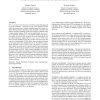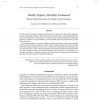2049 search results - page 18 / 410 » Normalization and Partial Evaluation |
WFLP
2000
Springer
13 years 11 months ago
2000
Springer
We introduce a framework for assessing the effectiveness of partial evaluators in functional logic languages. Our framework is based on properties of the rewrite system that models...
PEPM
1994
ACM
13 years 11 months ago
1994
ACM
Abstract. Selective eta-expansion is a powerful "binding-time improvement", i.e., a sourceprogram modification that makes a partial evaluator yield better results. But li...
PEPM
2007
ACM
14 years 1 months ago
2007
ACM
Poly-Controlled Partial Evaluation (PCPE) is a powerful approach to partial evaluation, which has recently been proposed. PCPE takes into account sets of control strategies instea...
APLAS
2007
ACM
13 years 11 months ago
2007
ACM
We have built the first family of tagless interpretations for a higher-order typed object language in a typed metalanguage (Haskell or ML) that require no dependent types, general...
DATE
2004
IEEE
13 years 11 months ago
2004
IEEE
We present a technique to improve the efficiency of hardware-software cosimulation, using design information known at simulator compile-time. The generic term for such optimizatio...


